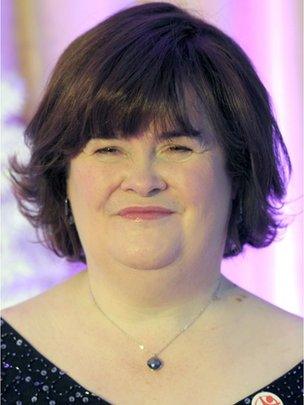Susan Boyle is part of autism's 'invisible generation'
- Published

Scottish singer Susan Boyle has been diagnosed with Asperger Syndrome, a form of autism. She is one of thousands of people who have the condition but were not diagnosed earlier in life.
The National Autistic Society (NAS) Scotland recently warned that there is an "invisible generation" of older people with autism.
The charity said there was still a tendency to associate the condition with children but it estimated that one in five people with autism were over 60.
Until a generation ago, the condition was often misunderstood and misdiagnosed.
Susan Boyle, who is 52, is typical of many, having spent years believing she suffered slight brain damage at birth.
Robert MacBean, from the National Autistic Society Scotland, said a "good diagnosis experience" was very important, regardless of a person's age.
He said: "A good experience leaves you understanding yourself, understanding what has been happening to you and also allows you to develop your own coping strategies.
"Unfortunately not everyone gets that experience. Some people, if they manage to get a diagnosis, it is after years of waiting and quite often they are left at the end with a leaflet and as they leave they are told 'don't worry about having a label'. That's all the support they get."
Social interaction
Autism can cause problems with social interaction, language skills and physical behaviour.
To people with the condition the world can appear chaotic with no clear boundaries, order or meaning.
It varies from mild to so severe that a person may be almost unable to communicate and need round-the-clock care.
Asperger syndrome is a milder form of autism, with symptoms that affect social interaction and behaviour.
Children with Asperger syndrome are often of average or above intelligence, and may be particularly good at learning facts and figures.
However, they may also lack imagination and find creative play or thinking in the abstract very difficult.
Mr MacBean said the prevalence rate for autism in Scotland was thought to be about one in 100 people, meaning more than 50,000 people would be on the autistic spectrum.
He said children were being diagnosed at school and receiving support, but it was a "complete lottery" whether adults got diagnosed.
Often they were misdiagnosed with other conditions such as bipolar disorder or schizophrenia, he said.
"Susan Boyle has been diagnosed with Asperger syndrome, which is a form of autism in which people quite often have verbal language, can present very well in terms of communication, but that often masks many of the difficulties they will be experiencing," he said.
Anxiety and stress
According to Mr MacBean, older people frequently only seek a diagnosis after somebody in the family or someone they know is found to have autism.
He added: "Unfortunately the other way in which people get a diagnosis is through mental health services.
"They will develop what looks like a mental health problem. Some of the people being diagnosed as adults will have been in mental health services for many years and will often have been misdiagnosed, for example with schizophrenia or some other condition."
Mr MacBean said that the "anxiety and stresses" of living with undiagnosed or unsupported autism can lead to people developing mental health problems.
However, he added: "Many people do manage to live successful independent lives. Many people can have a family, they can find work.
"They may find their interaction in certain situations difficult to deal with but they have learnt coping strategies.
"Quite often what they are really asking for is some basic understanding of themselves and their condition, and also for acceptance and tolerance from other people.
"Many people report they feel intimidated or bullied, often discriminated against because people don't understand their condition."
- Published8 December 2013